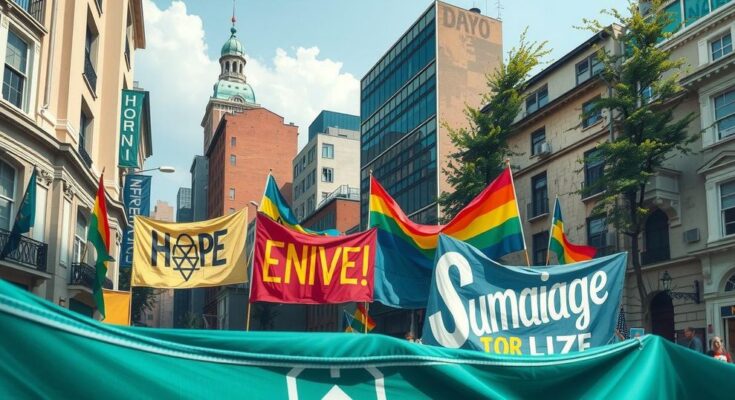On March 12, government forces in Buenos Aires brutally repressed protests by pensioners and workers against benefit cuts under President Javier Milei. The violent response resulted in numerous injuries and arrests, eliciting widespread condemnation and solidarity actions both domestically and internationally. Continuing threats of repression signal a troubling trend toward authoritarianism in governance, jeopardizing civil liberties.
On March 12, Buenos Aires witnessed a brutal crackdown by police on demonstrators comprised of pensioners, workers, and soccer fans protesting against benefit cuts. The response, approved by President Javier Milei’s administration, marked one of the most severe instances of state repression since the tumultuous events of December 2001. These protests have grown weekly as retirees demand an end to cuts to their pensions, reinstatement of medical benefits, and protection against inflation.
The police forces, ordered by Security Minister Patricia Bullrich, numbered over 1,000 and employed aggressive methods to disperse the gathering. Their actions included firing rubber bullets and tear gas grenades, as well as using pepper spray guns and water cannons. Evidence has emerged suggesting deliberate provocation from the authorities to undermine the protest’s peaceful nature, including reports of police leaving behind a car to incite vandalism.
The violent confrontation resulted in significant injuries, with over 672 individuals wounded, including an elderly pensioner and a press photographer. The latter, Pablo Grillo, sustained serious injuries from a tear gas grenade and remains in critical condition. Demonstrators vocally rejected the government’s actions, echoing chants reminiscent of past protests, and called for the resignations of Milei and Bullrich.
Alejandra Bartoliche, vice president of the Graphic Reporters Association, highlighted the ongoing assault on press freedom under the Milei administration, recalling past restrictions on police use of force. Critically, the government recently lifted bans on weaponry previously deemed excessive for controlling crowds, thus reinstating a more oppressive regime reminiscent of the Cold War era in Latin America.
Internationally, solidarity protests emerged in Uruguay and within Buenos Aires, reflecting widespread dissent against the repression experienced by retirees and the media. The government has anticipated continued protests, preparing to enforce rigorous measures to suppress dissent, including establishing barricades around key government locations.
In a recent statement, President Milei expressed a dismissive attitude towards retirees affected by his policies, characterizing them as antagonists against those advocating law enforcement efforts. The implications of his administration’s policies and international connections suggest a troubling trajectory toward authoritarianism and the prioritization of capitalist interests over social equity.
The violent crackdown on peaceful protests in Buenos Aires reflects a concerning trend of state repression under President Javier Milei’s administration. With rising dissent from pensioners and the press, the government’s strategy appears to lean toward authoritarian measures, prioritizing control over social issues. As protests escalate, the situation reveals deepening societal divides and a need for vigilance regarding civil liberties and democratic rights in Argentina.
Original Source: www.wsws.org




